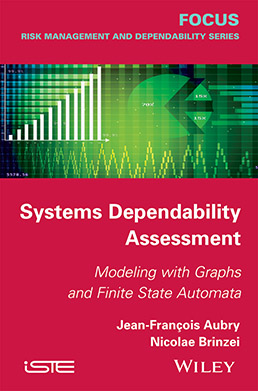
This book presents the recent developments in probabilistic assessment of systems dependability based on stochastic models from graph theory, finite state automaton and language theory, to be applied across static, dynamic and hybrid contexts.
The first part of the book presents the foundations of coherence property represented by a state graph model to show how the reliability of a system may be determined. An algorithm with lower complexity than the classical approach (BDD decomposition for example) is proposed and extended to apply to non-coherent systems by introducing the concept of terminal tie-set.
In the second part, the authors introduce the model of finite state automaton to generally represent systems and replace the concepts of cut-sets and tie-sets by the concept of event sequences. The model is enriched progressively to define hybrid stochastic automaton that allows us to consider all of the problems usually assembled around the concept of dynamic reliability. Examples of Monte Carlo simulations are also presented.
This book targets engineering students interested in risk and dependability assessment and engineers working in aeronautics, space, energy, transportation and safety fields, as well as individuals with knowledge in applied mathematics and probability theory, and professionals in safety management.
Part 1. Predicted Reliability of Static Systems; A Graph-Theory Based Approach
1. Static and Time Invariant Systems with Boolean Representation.
2. Reliability of a Coherent System.
3. What About Non-Coherent Systems?
Part 2. Predicted Dependability of Systems in a Dynamic Context
4. Finite State Automaton.
5. Stochastic FSA.
6. Generalized Stochastic FSA.
7. Stochastic Hybrid Automaton.
8. Other Models/Tools for Dynamic Dependability versus SHA.
Jean-François Aubry is Professor Emeritus at the University of Lorraine, France. His research interests include control systems and safety engineering, dynamic reliability and reliability assessments.
Nicolae Brinzei is Associate Professor at the University of Lorraine, France. His research interests include probabilistic models, applied probability, stochastic modeling and hybrid systems.